'Thank you for your hard work!"published at 03:30 BST 1 October 2019
Xi Jinping is greeting the soldiers as he is driven past in his inspection of troops. "Good job, Comrades! Thank you for your hard work, Comrades!"
Protesters and police were involved in violent clashes in Hong Kong.
Tear gas and water cannons were used to disperse the demonstrators.
It came hours after Beijing marked 70 years since the Communist Party came to power with extravagant celebrations.
Military might was on show with processions of tanks, armoured units, drones and even an unmanned underwater vehicle.
China under communism defied expectations with its growth but has a very poor reputation for human rights.
Anna Jones, Andreas Illmer, Flora Drury, Joshua Cheetham and David Walker
Xi Jinping is greeting the soldiers as he is driven past in his inspection of troops. "Good job, Comrades! Thank you for your hard work, Comrades!"
Anna Jones
Singapore
As Xi Jinping drives along this VAST line up of troops and military equipment, here's a little more from the speech he just gave.
"The Chinese people managed to stand up on their feet and embark on the green journey of national rejuvenation...
"Today China is standing in the gates of the world and there is no force that can shake the foundations of this nation. No force can stop the Chinese people and the Chinese nation forging ahead."
That last line is really underlined by the scale of the military hardware on display right now. China wants to show the world - and crucially its own people - that it is now a force to be reckoned with. Though the consistent messaging before today has been this is a peace-loving nation, with a military primarily aimed at defence. Officials have stressed that this parade is not aimed at any particular country.
Alexander Neill
International Institute for Strategic Studies
Hi, I'm Alexander Neill, Shangri-La Dialogue Senior Fellow from the International Institute for Strategic Studies.
I'm joining the BBC team in Singapore to cover the parade, keeping an eye out for latest weapons systems of the People's Liberation Army and their significance.
Sixty elite guards are setting the pace for the parade under a blue sky. Xi has arrived in the open-top inspection limousine to review the troops lined up along Chang'an Avenue.
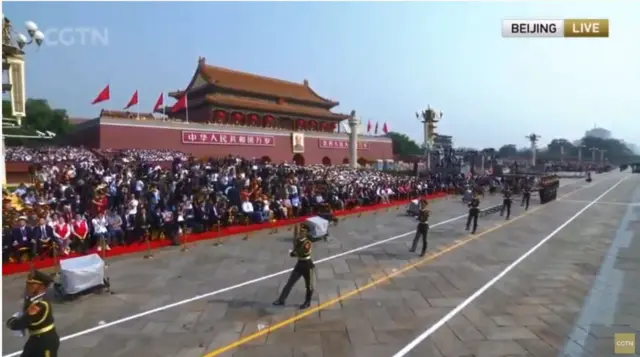 Image source, CGTN
Image source, CGTNAnna Jones
Singapore
As expected, Xi Jinping is delivering a message of unity and prosperity to the public. He's pledging that the government will "put people first" and "meet people's aspirations for a better life".
He's also mentioned Hong Kong and Macau - pledging to maintain their "long-term prosperity".
"Forging ahead, we must remain committed to the strategy of peaceful reunification," he says. That's a reference to Taiwan, which China believes is a province that brokeaway after the Kuomintang was defeated in 1949 and will one day be brought back to the mainland. They have never ruled out force in doing so.
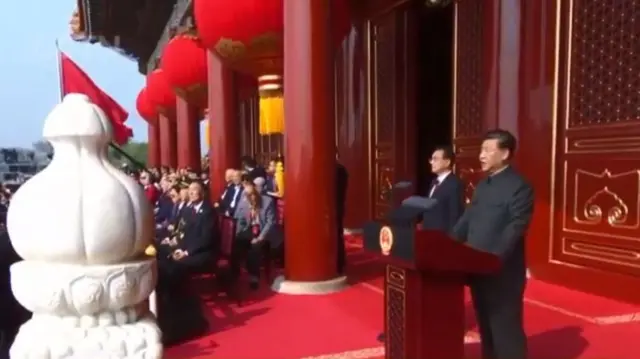 Image source, CGTN
Image source, CGTNTessa Wong
Hong Kong
President Xi Jinping is speaking now. He said: "Today, 70 years ago, Comrade Mao Zedong announced the People's Republic of China's establishment to the world. Chinese citizens have since stood up, and with this great event, it ended a period of more than 100 years that was a humiliating period in our history. Since then Chinese people have embarked on a noble and great journey."
Update on the guns - it was 56 guns which each fired 70 times.
The significance of the 70 is perhaps obvious, while the 56 represents the number of different ethnic groups that China recognises as making up its population. The most numerous of those is the Han Chinese.
We'll almost certainly see representatives of all the ethnic groups marching in today's civilian parade. Many people will be on the lookout for representatives of the Uighurs, the mostly Muslim ethnic group from western Xinjiang province who have been detained en masse in recent years in what China calls terrorism-prevention training camps.
Anna Jones
Singapore
Premier Li Keqiang has formally announced the opening of the celebrations. We've got a many-gun salute now - I've lost count. And soldiers marching slowly information towards the vast flagpole in Tiananmen Square where they'll raise the Chinese flag.
Also on the podium, watching events along with China's current leaders, are former leaders Jiang Zemin and Hu Jintao.
To fanfares, President Xi Jinping has entered Tiananmen Square along with China's other leaders. Mr Xi is extraordinarily powerful - last year he was cleared to become president for life. His doctrine - informally called Xi Jinping Thought - has officially been entered into the constitution. He is considered the most powerful Chinese leader since Mao Zedong, the man who declared the start of Communist Party rule in China.
Anna Jones
Singapore
The skies don't look great in Beijing, it must be said. Very smoggy skies as a drone swoops over the city and the endless military ranks lined up. We'll get some pictures to you asap. Lots of vigorous flag-waving from the crowds.
The live feed of Tiananmen Square has kicked in - we're seeing a huge stretch of Chang'an Avenue empty of regular vehicles but absolutely packed with military vehicles and personnel. It stretches for what looks like miles. And miles.
Andreas Illmer
Singapore
It's not just the live events that are being carefully choreographed - the domestic media coverage is as well.
While Anna and I are sitting in the BBC's Singapore bureau and can write without censorship, things would be very different if we were working for a Chinese publication. We'd obviously be expected to toe the party line anyway, but starting this October, we'd even have to sit an exam on Xi Jinping's teachings, officially called Xi Jinping Thought on Socialism with Chinese Characteristics.
"The fundamental point with this isn't so much about the content," David Bandurski of China Media Project told the BBC recently. "It is about reinforcing the message and understanding among journalists that they work, first and foremost, for the Chinese Communist Party, and serve its agenda."
Pratik Jakhar
BBC Monitoring
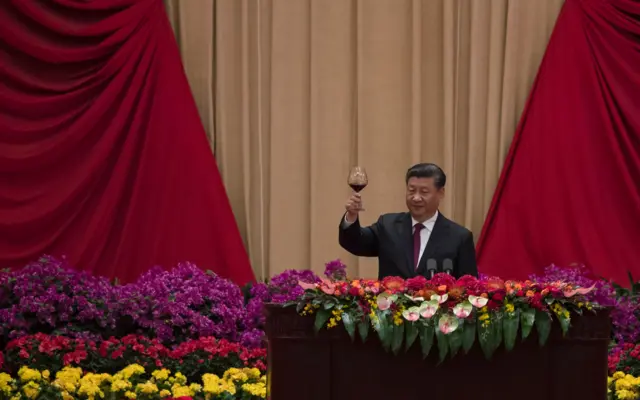 Image source, AFP
Image source, AFPThe anniversary comes at a particularly tricky time for China's President Xi Jinping, as he faces difficulties on multiple fronts. A protracted trade war with the US, relentless protests in Hong Kong, slowing economy, and rising pork prices provide a sombre backdrop for grand celebrations.
In a speech on 3 September, Mr Xi mentioned the Chinese word for "struggle" more than 50 times, reminding young cadres of "a series of major risks and tests the country faces".
The Chinese state media - which never miss an opportunity to trumpet the country's achievements - have also been unusually candid about the "extraordinary challenges". The challenges have even prompted discussions among commentators that Xi may be "fierce internal struggles and squabbles within the Chinese Communist Party". But it’s hard to tell if there's any backlash against him given the opaque nature of Chinese politics, where infighting takes place behind the scenes, and dissent is immediately silenced.
Across much of the city centre, national flags have been set up at basically every single door. And it's been like that for days already.
It's not just flags though - voluntary inspectors have been monitoring the streets in the run-up to Thursday and locals have told the BBC they were questioned for things as little as having a brief chat with foreigners
One person that after some foreign friends visited her, she had to answer to police asking: "Who were those foreigners? Why were they here?"
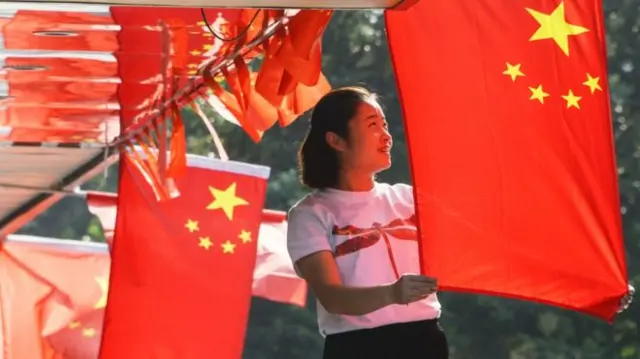 Image source, Getty Images
Image source, Getty ImagesTessa Wong
Hong Kong
Hong Kong woke up today to find its downtown area already on a partial lockdown, with a large security presence and underground MTR services suspended at several stations near locations where protests are expected to flare up later today.
As the sun rose, small groups of activists from both sides of the political divide began taking to the streets, according to BBC Chinese colleagues. In Wan Chai, a touristy downtown district, a group of pro-democracy protesters dressed in black did a short march led by well-known politician Leung Kwok-hung (also known as Long Hair). Meanwhile, a handful of people wearing red shirts stood at a street corner singing Chinese patriotic songs. Through it all, police kept a watchful eye.
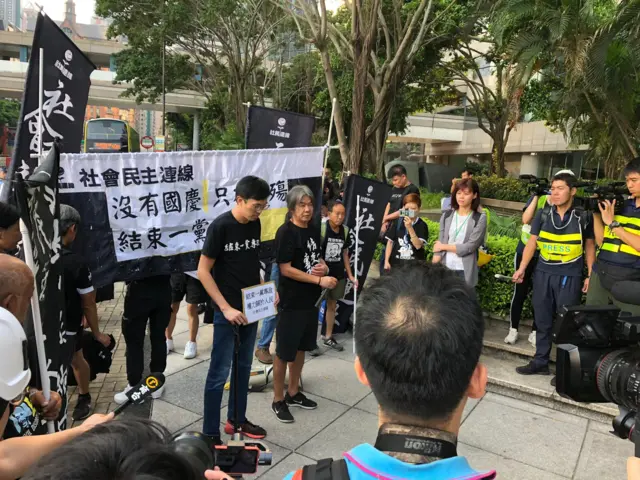 Image source, Zhijie Shao
Image source, Zhijie ShaoProtesters clad in black called for democracy in Hong Kong...
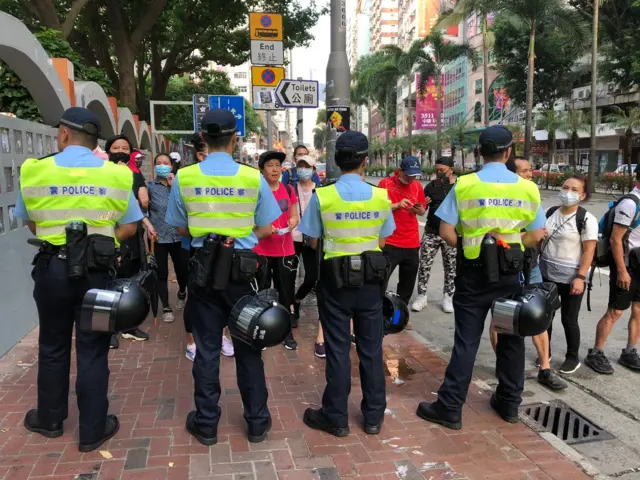 Image source, Zhijie Shao
Image source, Zhijie Shao...while a handful of red-shirted activists sang Chinese patriotic songs.
Anna Jones
Singapore
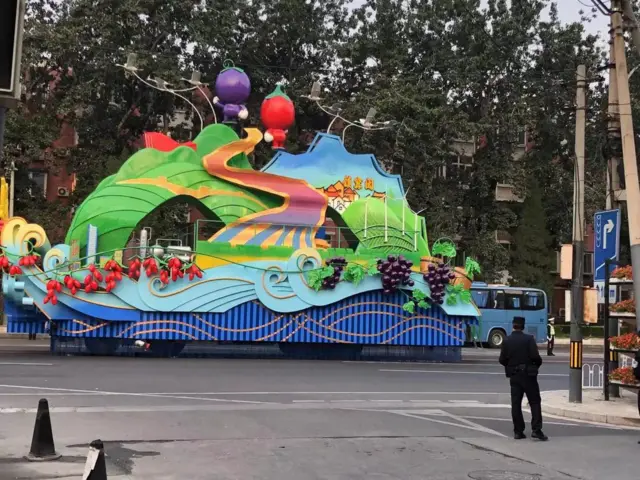
This float was spotted in the streets of Beijing this morning
The Chinese government hasn't given all that much information about today's events. We don't know for sure what time the parade will start - soon though - but we do know that it's open to invited guests and select members of the public only. And they've heavily vetted the media.
We're expecting President Xi Jinping to inspect the troops in Tiananmen Square or along Chang'an Avenue before the full display on land and in the air.
And we know that the guns will be followed by a civilian parade involving about 100,000 people. Last week a Communist Party official said it would be a "free, vivid, happy and lively show" with "extensive participation". They’ll be telling the history of modern China, we're told.
Beijing is notoriously polluted and skies are more often grey than blue. To ensure the sun will join the celebration, several coal plants and construction sites in and around the city have been ordered to stop work.
Possibly not enough though? Here's a pic we just got from our colleagues on the ground in Beijing.
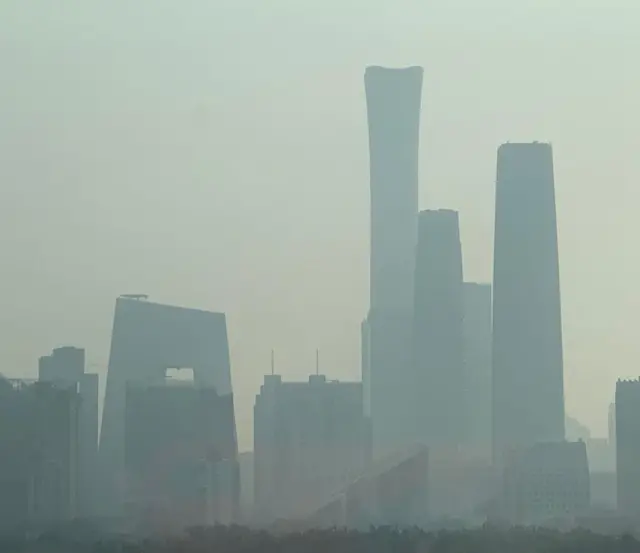
Andreas Illmer
Singapore
So what are we likely to see in today’s military parade? Well, the government has said it will be the biggest parade it's put on in years, bigger than events marking the anniversary 10 or 20 years ago and bigger than marking 70 years since the end of World War Two.
Officials have said there'll 15,000 military personnel taking part, 580 pieces of military equipment rolling through the streets and 160 aircraft flying overhead.
A crucial part we're expecting is Beijing showing off its "advanced weapons" - all of them proudly developed in China.
It's all taking place in Tiananmen Square in front of officials, selected members of the public, and 188 military attaches from 97 countries.
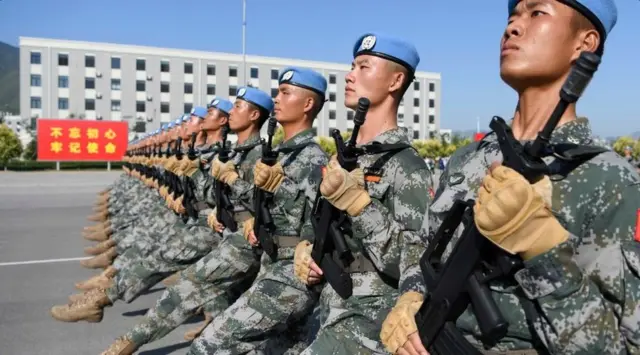 Image source, Getty Images
Image source, Getty ImagesChinese soldiers conduct drills ahead of National Day
If the past weeks' demonstrations are anything to go by, the smiles and celebrations in Beijing will be competing for media space with pictures of tear gas and angry young protesters in Hong Kong.
There are always anti-Beijing protests in Hong Kong on 1 October - known as National Day - but this time, they have added meaning.
Official celebrations in the territory have been toned down to avoid clashes - the dawn flag-raising ceremony which normally takes place on the waterfront was moved indoors and there'll be no fireworks display. At least six protest marches are planned.
Andreas Illmer
Singapore
Modern China - the People's Republic of China - was founded in 1949 after the Communist Party won the civil war which followed World War Two.
The Communist Party and the ruling Kuomintang had made peace during WW2 but afterwards turned on each other. After Mao Zedong defeated the Kuomintang, led by Chiang Kai-shek, it retreated to Taiwan, creating two rival states claiming to be the real China.
The National Day is of course marked each year, but this time round, things have been taken up a notch. Why? It's the first big anniversary since China has emerged as a global power. Ten years ago, China was a superpower in the making, but by now the country is economically eye-to-eye with the United States.
Our colleague Robin Brant was out and about bright and early this morning in Beijing, to catch a glimpse of events. He's just sent us this rather gorgeous picture of the sun coming up over the city. Beijing's streets are not, it should be noted, normally this quiet.
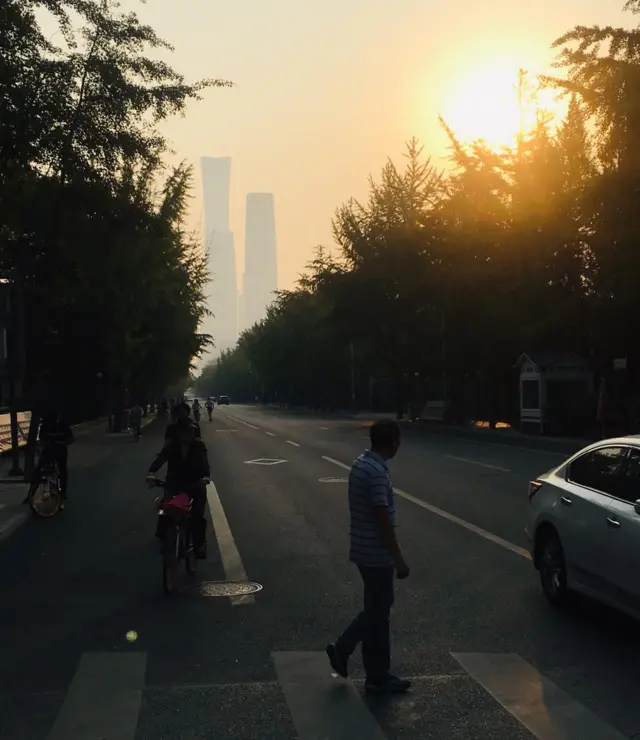 Image source, BB
Image source, BB